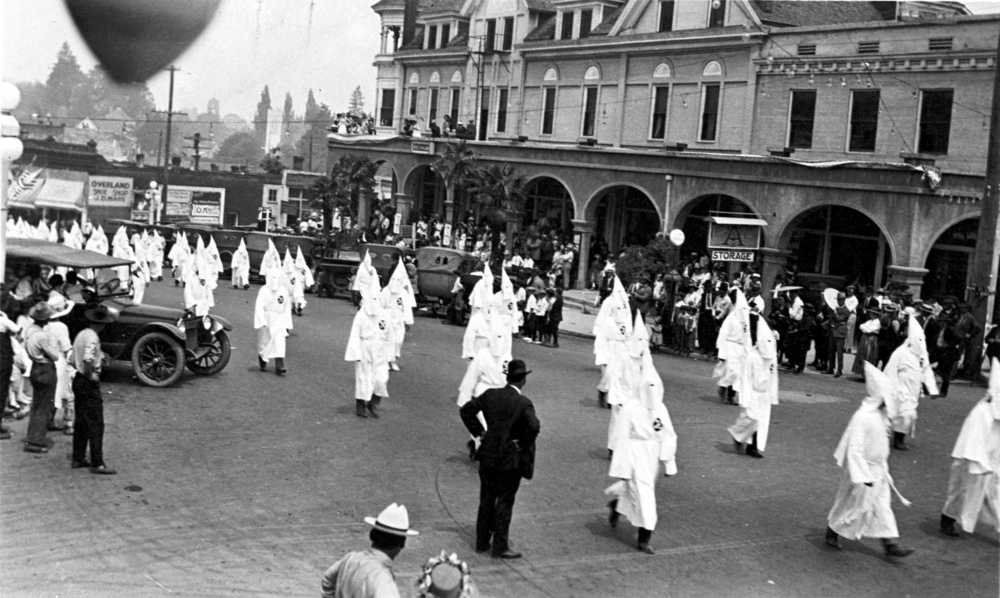Armed with an arsenal of conspiracy theories and anti-government and anti-tax ideas, Henry L. "Mike" Beach (1903-1989), a retired Portland businessman and former Silver Shirt (an antisemitic/fascist organization active in the 1920s-1930s), organized the Citizen's Law Enforcement Research Committee (CLERC) in 1969. The organization drew little notice until it spawned the Sheriff's Posse Comitatus.
Posse Comitatus is a Latin term that is sometimes taken to mean that the county is the highest legitimate government body. Embracing this view, Beach declared that a county’s citizens, as defined by its laws, could deny state and federal authority to tax, regulate, and govern. Voters elected the sheriff as the principal enforcement official, with the authority to deputize male citizens. But the county citizenry reserved the right to establish a grand jury outside the prevailing court system to indict, judge, and punish public officials and private citizens.
Scholars disagree about calling Beach the founder of the Posse. He took many ideas and words from the publications and speeches of retired U.S. Army officer William Potter Gale of Mariposa, California, whose antisemitic rhetoric drew national attention and camouflaged his Jewish heritage. Gale also had roots in Oregon. As a child, he lived several years in Portland and Corvallis, and his great uncle Marcus and wife Rosa Gale were prominent members of Congregation Neveh Zedek, now Neveh Shalom, in Portland.
In 1973, Beach published and distributed the Sheriff's Posse Comitatus "Blue Book" and issued charters for the new organization. Typically motivated by financial crises, conspiracy theories, and the racial and religious doctrines of Christian Identity beliefs, Posse members became an ideological catalyst for new organizations on the Radical Right. Operating primarily in the nation's agricultural heartland and the Pacific Slope states, the Posse was a decentralized association of small groups whose members combined the survivalist's defensive posture with an aggressive effort to harass and intimidate public officials and bankers with legal challenges, the public display of weapons, and periodic violence, especially in the 1980s.
The Posse movement grew slowly in Oregon. One group registered its charter in Lane County on November 2, 1973, and, according to FBI investigators, established the first citizens' grand jury in the nation in 1974. By then, Sylvester P. Ehr, a sign painter also with Silver Shirt ties, had displaced Beach as leader of the Multnomah County Posse. National leadership shifted to Wisconsin, and Gale became more widely recognized as the founder of the organization.
Activities briefly escalated in Oregon in 1976. A Posse leader claimed the organization was active in sixteen of the state's thirty-six counties, but fewer than 100 members, including Beach, attended the first convention of the Oregon Association of Posse Comitatus in Pendleton in March. Also that year, the Umatilla County Posse demanded that the sheriff arrest the county district attorney and judges, and a self-proclaimed Posse member carried a rifle into a land-use planning meeting in downtown Portland.
The Josephine County Posse issued documents "charging the county commissioners with counterfeiting and giving comfort to subversives." In April, Sam Porter, a Josephine County Posse member, filed a $150 million lawsuit in Marion County charging that Governor Robert Straub, Attorney General Lee Johnson, and five justices of the Oregon Supreme Court were guilty of conspiracy and fraud. The complaint demanded that the Marion County sheriff arrest Chief Justice Kenneth O'Connell as a felon. In August, Posse involvement in a land dispute made national news when seven armed men occupied a shed on the Mikami Brothers' potato farm near Stanfield in Umatilla County. Police arrested the men, five of them from California, after a brief standoff.
News of Posse activities in later decades faded with the organization as other anti-government and anti-tax groups gained attention, many of them using Posse doctrine. Portlanders experienced a momentary scare in 1985 with reports of FBI raids on two homes after Posse members were rumored to be planning a murder-arson attack on two local judges. Beach, meanwhile, went into self-imposed exile, spending much of the year near North Powder in Union County after the mid 1970s.
-
![]()
Article on Silver Shirts, Canby Herald, Feb. 22, 1940.
Courtesy Oregon Hist. Soc. Research Lib., Mss2948, Box 2, Silver Shirts
Related Entries
Related Historical Records
Map This on the Oregon History WayFinder
The Oregon History Wayfinder is an interactive map that identifies significant places, people, and events in Oregon history.
Further Reading
Barkun, Michael. Religion and the Racist Right: The Origins of the Christian Identity Movement (rev. ed.). Chapel Hill: University of North Carolina Press, 1997.
Coates, James M. Armed and Dangerous: The Rise of the Survivalist Right. New York: Hill and Wang Publishers, 1987.
Corcoran, James. Bitter Harvest: Gordon Kahl and the Posse Comitatus, Murder in the Heartland. New York: Viking, 1990.
Toy, Eckard V. "Silver Shirts in the Pacific Northwest: Politics, Prophecies, and Personalities in the 1930s." Pacific Northwest Quarterly 80 (Oct. 1989): 139-146.




